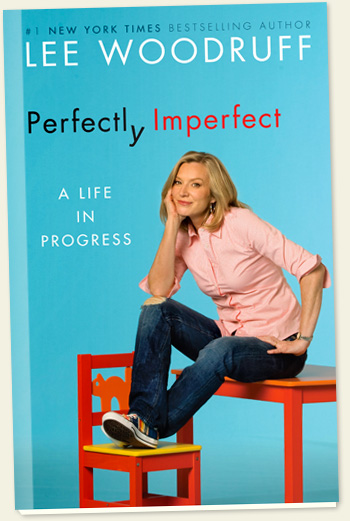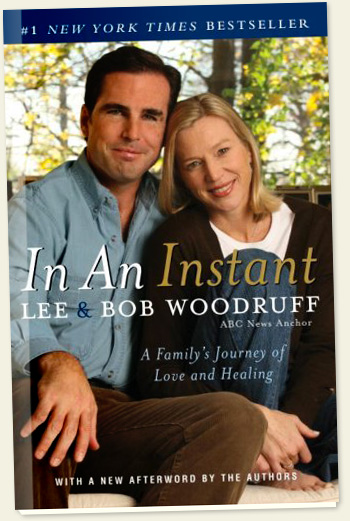A BULLET IN THE KITCHEN
 September 2, 2009
September 2, 2009  25 Comments
25 Comments
There it was. A bullet in my sink. That’s right, a bullet. We’d been gone all summer and we came home to find a bronze metal bullet standing straight up like a bra cup in my stainless steel sink.
I thought nothing of this. My husband had spent half of his reporting life covering wars and he’d been in and out of the house all summer. After his visits overseas, odd items showed up around our house as a result of covering stories in third world countries. We now had a collection of knives, spears, and weird guns that looked like blunderbusses or something from the colonial era.
He spent a great deal of time reporting on the wars in Iraq and Afghanistan and the wounded families left in their wake. He hung out with soldiers who had recently returned, had a cache of awards and honors and military coins of his own that had been given to him by various generals and commanders in all branches.
So when I walked in and saw the bullet, I shrugged. No big deal. It must have fallen out of his stuff while we’d been away, pulled out during his nightly emptying-the-pockets routine. Over the next few days, as we unpacked and settled back into the house, the subject of the bullet came up.
“Why is there a bullet in our kitchen?” my daughter asked, and I shrugged.
“It must be Dad’s,” I said. “He just got back from Iraq and Afghanistan. Maybe he got it over there.”
“Mom, nice bullet!” my son Mack said to me the next morning, breezing into the kitchen after sleeping until noon.
“The better to keep you in line with,” I joked. He was leaving for college in five days and his absence and truculence was getting on my nerves. He was being mean to me, subconsciously on purpose, to help with the cutting of ties.
“Did you know there is a stray bullet in the kitchen? “ Bob asked me casually one day. And that was when I perked up. The use of the word stray implied that there were more, tamer ones, bullets that stayed in line.
“Yeah, isn’t it yours?”
“Mine? Nope. What would I be doing with a bullet?” he said as if I was accusing him of packing heat.
I then questioned the babysitter, who wasn’t a weapons kind of gal, but she had been keeping an eye on the house and cleaning during our absence.
“Diana,” I said casually. “Any chance you left a bullet lying around?
Her eyes widened in response. “It’s so strange,” she said. “One day that bullet was just here, in the kitchen,” she said solemnly. She couldn’t really pinpoint exactly when it had appeared.
Bob had suggested throwing it out. We probably did need to get rid of the bullet, but no one seemed to want to take responsibility.
Now I was nervous. Who, other than dictators and mobsters, finds bullets in their kitchen? Was this a symbol? A sign? A warning?
We lived in a fairly quiet, white and uptight neighborhood. It’s not exactly drive-by shooting territory, but who knows, maybe the bullet had been shot through a window. Maybe my husband had just ended an affair, my son had made an enemy on the soccer field or perhaps I had cut somebody off in the church parking lot. Goodness gracious there was a lot of talk about road rage these days. Anything was possible.
So here was the thing. There was a bullet….. standing up, in my kitchen.
We talked about the bullet on and off and back and forth, as if none of us wanted to be the one to dispose of it. Maybe, in essence, the bullet worked in reverse as a kind of protection, armor or amulet.
And so the days passed. And the bullet stayed. It moved from the counter up to the window sill. It stood, like some common household appliance, right next to the kitchen timer, as causally as people perch salt and pepper shakers next to each other.
“What if it falls into the garbage disposal and goes off with a bang?” my husband joked with me as he poured milk in his coffee one morning, But still, I felt unable to throw it out. And I didn’t want him to either.
Somehow that bullet was meant to be in our kitchen, I determined. It had become kind of comforting, protective.
“Why is a bullet in the kitchen?” asked my mother in law a week later as she visited from Detroit. She was doing the dishes after dinner and had glanced up at the window sill where it sat pointing skyward like a mini missile silo.
“It’s for good luck,” I answered simply. And she, who is hard of hearing and is becoming more garbled in thought and speech, nodded her head as she scrubbed the pots, as if this was the most normal thing in the world.







